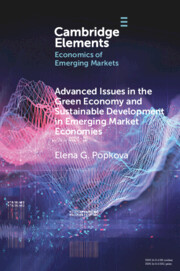Element contents
Advanced Issues in the Green Economy and Sustainable Development in Emerging Market Economies
Published online by Cambridge University Press: 28 March 2022
Summary
- Type
- Element
- Information
- Online ISBN: 9781009093408Publisher: Cambridge University PressPrint publication: 21 April 2022
References
- 12
- Cited by



